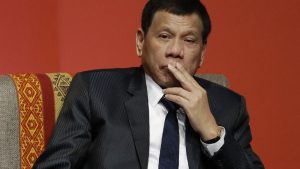
President Duterte despises international bodies and foreign leaders who comment on the way he runs the Philippine government, so much that he repeatedly declares he is not answerable to any of them so long as the Filipino people support him in what he does.
This week, he angrily reacted to the recent move of the Prosecutor of the International Criminal Court (ICC) to initiate a “preliminary examination” of the situation in the country with regard to the ongoing war on drugs. Before a group of newly appointed government officials, the President fulminated: “You cannot acquire jurisdiction over me, not in a million years, that’s why I am not answering. That is true. I do not like to say that it has been my weapon ever since. Sh*t. Do not believe them.”
Such bravado may warm the hearts of those who continue to be haunted by the ghost of 350 years of colonial subjugation, and who see in every foreign criticism an assault on national sovereignty. But, the modern world is anything but the mere aggregate of nation-states that it was before World War II.
What is upon us today is a global system that is evolving in ways never before seen. This system’s functional domains are, clearly, unevenly developed. But, some— like the economy and the mass media—are sufficiently in an advanced stage of globalization, producing opportunities and disruptions beyond the capacity of any nation-state to control. Others—like science and education—are steadily delinking themselves from their national moorings in order to participate in a more dynamic world community. It is not to say that globalization has erased inequalities; indeed, it has exacerbated these in many ways.
Being the last bastions of the nation-state, the legal and political systems are probably the slowest to evolve in their global form. We are still a long way from having a world government. The xenophobia that has swept much of Western Europe in the last couple of years in reaction to the massive influx of refugees and migrants displaced by war only shows the immense difficulty of institutionalizing a universal human rights regime even in the most advanced democracies.
But, beneath these persistent crises, a lot of progress has been made, often unseen on the public radar screen. Components of a global legal regime are fast taking shape under the auspices of multilateral agreements and covenants to which, over the years, nation-states have voluntarily acceded. The Rome Statutes, which created the ICC, specifically to hold individuals accountable for crimes against humanity and atrocities committed with impunity, would be a prime example of this evolving global legal system.
Still, there are those who see in these global tribunals the unseen hand of Western imperialism. Never mind that Filipino nationals may often be found performing vital roles in these international bodies. Raul Pangalangan, a former dean of the University of the Philippines College of Law, for example, sits as a judge in the ICC, actively participating in a timeless global endeavor to exact justice across national boundaries. An activist of Igorot ethnicity, Victoria Tauli-Corpuz, serves as a United Nations special rapporteur on the rights of indigenous peoples. We ought to be proud of them.
A concept like the ICC cannot succeed if it is imposed from above. Governments voluntary sign up to join, in recognition of those times when a country’s own justice system, for any number of reasons, may be unwilling or unable to investigate and hold accountable those who have committed crimes against humanity right in its own backyard. Only in such instances does the ICC feel mandated to step in. At the heart of its mission is the principle of “complementarity”—its objective is to complement, rather than supplant, a sovereign nation’s justice system.
President Duterte and the high-ranking civilian and police officials—who have initiated, designed, and implemented the murderous war on drugs—may believe they will never come under the ICC’s jurisdiction. They may think that as long as the domestic courts are operating, and investigations and prosecutions are being conducted, the ICC would have no reason to intervene. They should read Jenny Domino’s recent essay in the Cambridge International Law Journal, titled “Can the Philippines overcome the principle of complementarity?” Ms Domino, who is completing her master of laws at Harvard University, used to be an intern at the ICC.
She notes that there may be a clear opening for the ICC to come in. She writes: “At present, however, no investigation, much less prosecution, has been conducted on any high-ranking official most responsible for planning and implementing Operation Tokhang, the Philippine National Police’s (PNP) official campaign through which the extrajudicial killings were allegedly committed.”
Presidential spokesperson Harry Roque surely knows this, being the only Filipino lawyer who is qualified to appear before the ICC. It may explain his careful choice of words: “Because the Philippine courts are able and willing, the International Criminal Court has no jurisdiction.” Roque confidently invokes the principle of complementarity, forgetting that ability and willingness to investigate and prosecute are problematic terms.
Each time President Duterte speaks in total support of the actions of his top officials in the conduct of the antidrug war— and almost always in contempt for human rights—the ICC has every reason to ask whether a credible investigation by Filipino authorities of these mass killings is possible at all under this administration.
public.lives@gmail.com
